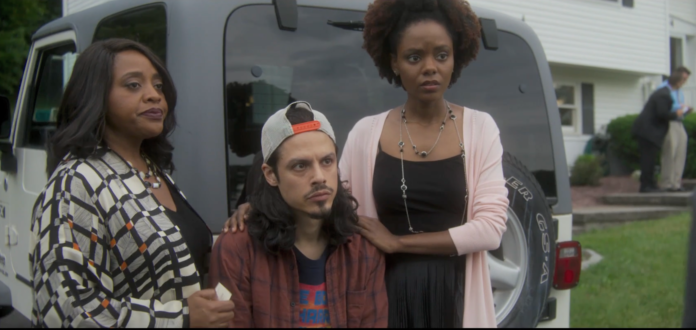The gay B-movie, “The Way Out,” available February 10 on digital platforms (Amazon, Apple TV, etc.) is like an ersatz version of those trashily entertaining “bad roommate” thrillers, like “Single White Female.” But this ambitious drama, written and directed by Barry Jay (founder of Barry’s Gym), focuses mostly on characters recovering from alcoholism and sexual abuse, making it very much an “issue” movie.
Jay’s film opens with Alex (Jonny Beauchamp) failing at a suicide attempt. One year later, and with the help of his sponsor, Veronica (Sherri Shepherd), Alex is hoping to reconcile with his estranged alcoholic father (Anthony Ruiz). However, when he arrives at his family home, he discovers that his father has been brutally murdered. While Detective Cole (Alison Robertson), asks Alex a few questions, and pledges to find the killer, this storyline is mostly dropped in favor of the other narrative threads.
Inheriting debt along with the house, Alex advertises for a roommate. Enter Shane (Mike Manning), who is handsome, charming, and flush with cash. Alex jumps at the chance to cohabit with Shane, who makes him “feel safer” — much to his bestie, Gracie’s (Ashleigh Murray) dismay. Not only does Gracie think Shane is hiding something, she insists Alex does not hook up with him.
Whereas Shane, who says he is a trainer, is all cocky, confident, and muscular, Alex is insecure and malleable. Shane, of course, has an immediate and positive impact on his new roomie. He helps Alex toughen up physically, by teaching him to box and fight for what he wants, but also mentally, encouraging him to assert himself when it comes to getting what he wants using a “Don’t dream, do” philosophy. Shane empowers Alex to be more honest, step out of his comfort zone, and even quit his lousy job delivering pizzas. Shane also shows Alex how to behave in the bedroom, with a lesson on intimacy, to make his sex more satisfying.
“The Way Out” certainly makes Shane the more interesting character here, because Shane does indeed have a secret side — Gracie was right! It involves him posing as an escort to expose and confront sex offenders who have abused youths. One encounter, with Dale (Mitch Silpa), turns bloody (cue a gratuitous shower scene), while another incriminates Alex to ensure his silence. Shane’s motivation for his behavior eventually becomes clear for those viewers who can’t guess what happened in his past.
Manning’s performance may be more charismatic than chilling, but it suggests the film might have been best to have been told from Shane’s point of view. Rather than just focus on the impact of sexual abuse, Jay emphasizes Alex’s sobriety; his excessive drinking was a way of getting back at his alcoholic father. “The Way Out” chronicles Alex trying to resist the temptation to drink the open bottle of wine Shane (deliberately?) left on the counter. Alex also attends meetings, and hears speeches, such as Veronica sharing a tragedy at a meeting, or doling out life lessons to Alex such as “grow up” and “think about people other than yourself.” (Jay gets no points for being so didactic.)
Alex, however, is more pathetic than sympathetic, and Jonny Beauchamp plays him without much vigor. Despite some aggressive behavior, he does not seem to change much after being empowered by Shane. When Alex goes out on a date with Brent (Nick Theurer), a guy from his meetings, it goes badly, and he gets frustrated. When Alex hooks up with Randy (Damien Diaz), a hot guy from his pizza delivery job, it also goes badly, and leads to a gay-bashing incident that raises another issue in a film overloaded with traumas.
There is almost too much for Alex to process with his suicide attempt, his sobriety, the murder of his father, his attraction to his criminal roommate, being victimized by a homophobic gay basher, and his dating disasters. Beauchamp’s performance is too wishy-washy to make viewers feel any of these torments, much less all of them, which is the film’s biggest flaw. The actor reacts to almost everything that happens to him with a wide-eyed look of disbelief that viewers will likely mirror as Alex’s tribulations escalate. And Beauchamp is downright risible when Alex, a would-be songwriter, screams at Shane, “Don’t you listen to music with lyrics?!” as they are driving back from a crime with thrash metal blaring.
In contrast, Manning is appealing because he is so coolly sinister.
Oddly, “The Way Out,” remains compelling even as it gets more implausible, as when the denouement features a character imperiled in a ridiculous manner reserved exclusively for B-movies. It is a shame that Jay wants to raise awareness to the perils of abuse and alcoholism, among other things, but the film weakens the important messages by grafting them into an ultimately silly thriller.
